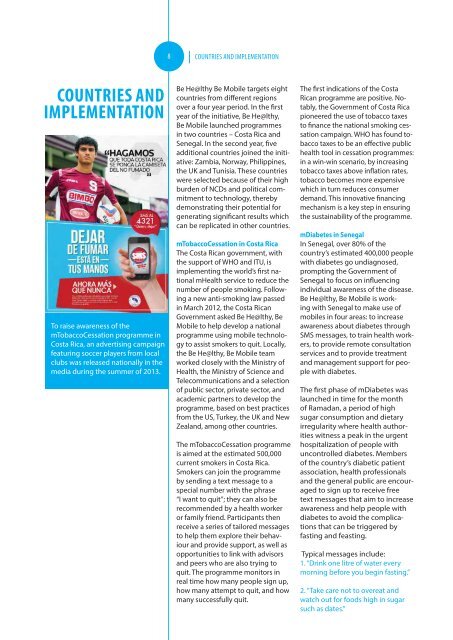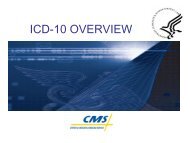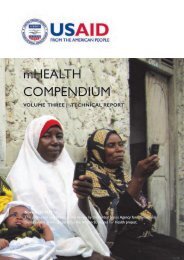LN9qa
LN9qa
LN9qa
Create successful ePaper yourself
Turn your PDF publications into a flip-book with our unique Google optimized e-Paper software.
8<br />
COUNTRIES AND IMPLEMENTATION<br />
COUNTRIES AND<br />
IMPLEMENTATION<br />
To raise awareness of the<br />
mTobaccoCessation programme in<br />
Costa Rica, an advertising campaign<br />
featuring soccer players from local<br />
clubs was released nationally in the<br />
media during the summer of 2013.<br />
Be He@lthy Be Mobile targets eight<br />
countries from different regions<br />
over a four year period. In the first<br />
year of the initiative, Be He@lthy,<br />
Be Mobile launched programmes<br />
in two countries – Costa Rica and<br />
Senegal. In the second year, five<br />
additional countries joined the initiative:<br />
Zambia, Norway, Philippines,<br />
the UK and Tunisia. These countries<br />
were selected because of their high<br />
burden of NCDs and political commitment<br />
to technology, thereby<br />
demonstrating their potential for<br />
generating significant results which<br />
can be replicated in other countries.<br />
mTobaccoCessation in Costa Rica<br />
The Costa Rican government, with<br />
the support of WHO and ITU, is<br />
implementing the world’s first national<br />
mHealth service to reduce the<br />
number of people smoking. Following<br />
a new anti-smoking law passed<br />
in March 2012, the Costa Ri can<br />
Government asked Be He@lthy, Be<br />
Mobile to help develop a national<br />
programme using mobile technology<br />
to assist smokers to quit. Locally,<br />
the Be He@lthy, Be Mobile team<br />
worked closely with the Ministry of<br />
Health, the Ministry of Science and<br />
Telecommunications and a selection<br />
of public sector, private sector, and<br />
academic partners to develop the<br />
programme, based on best practices<br />
from the US, Turkey, the UK and New<br />
Zealand, among other countries.<br />
The mTobaccoCessation programme<br />
is aimed at the estimated 500,000<br />
current smokers in Costa Rica.<br />
Smokers can join the programme<br />
by sending a text message to a<br />
special number with the phrase<br />
“I want to quit”; they can also be<br />
recommended by a health worker<br />
or family friend. Participants then<br />
receive a series of tailored messages<br />
to help them explore their behaviour<br />
and provide support, as well as<br />
opportunities to link with advisors<br />
and peers who are also trying to<br />
quit. The programme monitors in<br />
real time how many people sign up,<br />
how many attempt to quit, and how<br />
many successfully quit.<br />
The first indications of the Costa<br />
Rican programme are positive. Notably,<br />
the Government of Costa Rica<br />
pioneered the use of tobacco taxes<br />
to finance the national smoking cessation<br />
campaign. WHO has found tobacco<br />
taxes to be an effective public<br />
health tool in cessation programmes:<br />
in a win-win scenario, by increasing<br />
tobacco taxes above inflation rates,<br />
tobacco becomes more expensive<br />
which in turn reduces consumer<br />
demand. This innovative financing<br />
mechanism is a key step in ensuring<br />
the sustainability of the programme.<br />
mDiabetes in Senegal<br />
In Senegal, over 80% of the<br />
coun try’s estimated 400,000 people<br />
with diabetes go undiagnosed,<br />
prompting the Government of<br />
Senegal to focus on influencing<br />
individual awareness of the disease.<br />
Be He@lthy, Be Mobile is working<br />
with Senegal to make use of<br />
mobiles in four areas: to increase<br />
awareness about diabetes through<br />
SMS messages, to train health workers,<br />
to provide remote consultation<br />
services and to provide treatment<br />
and management support for people<br />
with diabetes.<br />
The first phase of mDiabetes was<br />
launched in time for the month<br />
of Ramadan, a period of high<br />
sugar consumption and dietary<br />
irregularity where health authorities<br />
witness a peak in the urgent<br />
hospitalization of people with<br />
uncontrolled diabetes. Members<br />
of the country’s diabetic patient<br />
association, health professionals<br />
and the general public are encouraged<br />
to sign up to receive free<br />
text messages that aim to increase<br />
awareness and help people with<br />
diabetes to avoid the complications<br />
that can be triggered by<br />
fasting and feasting.<br />
Typical messages include:<br />
1. “Drink one litre of water every<br />
morning before you begin fasting.”<br />
2. “Take care not to overeat and<br />
watch out for foods high in sugar<br />
such as dates.”





